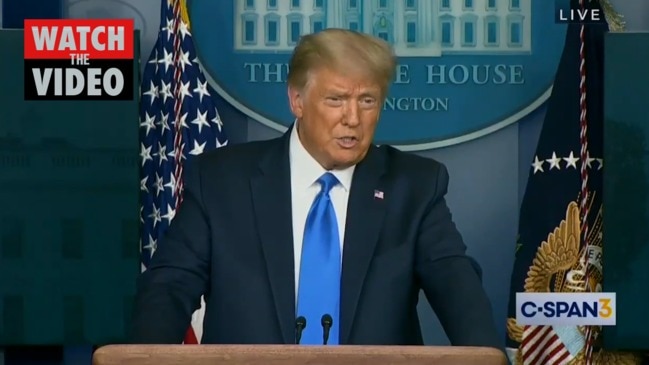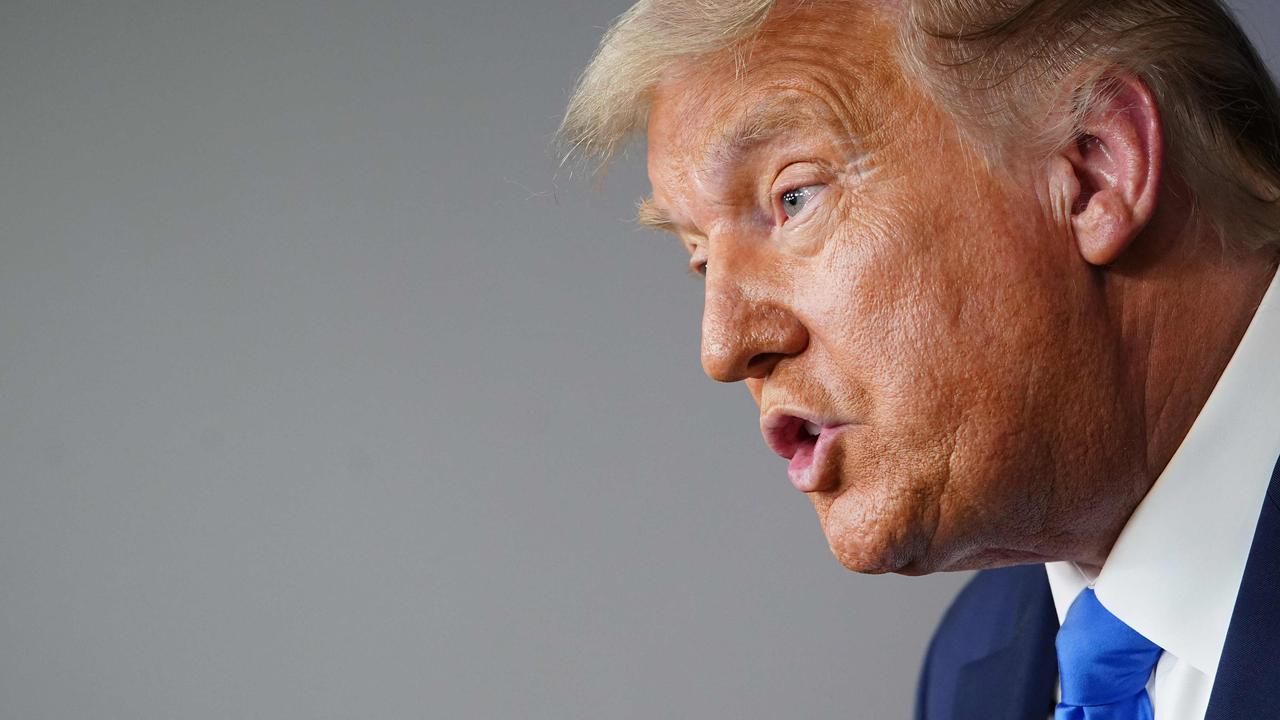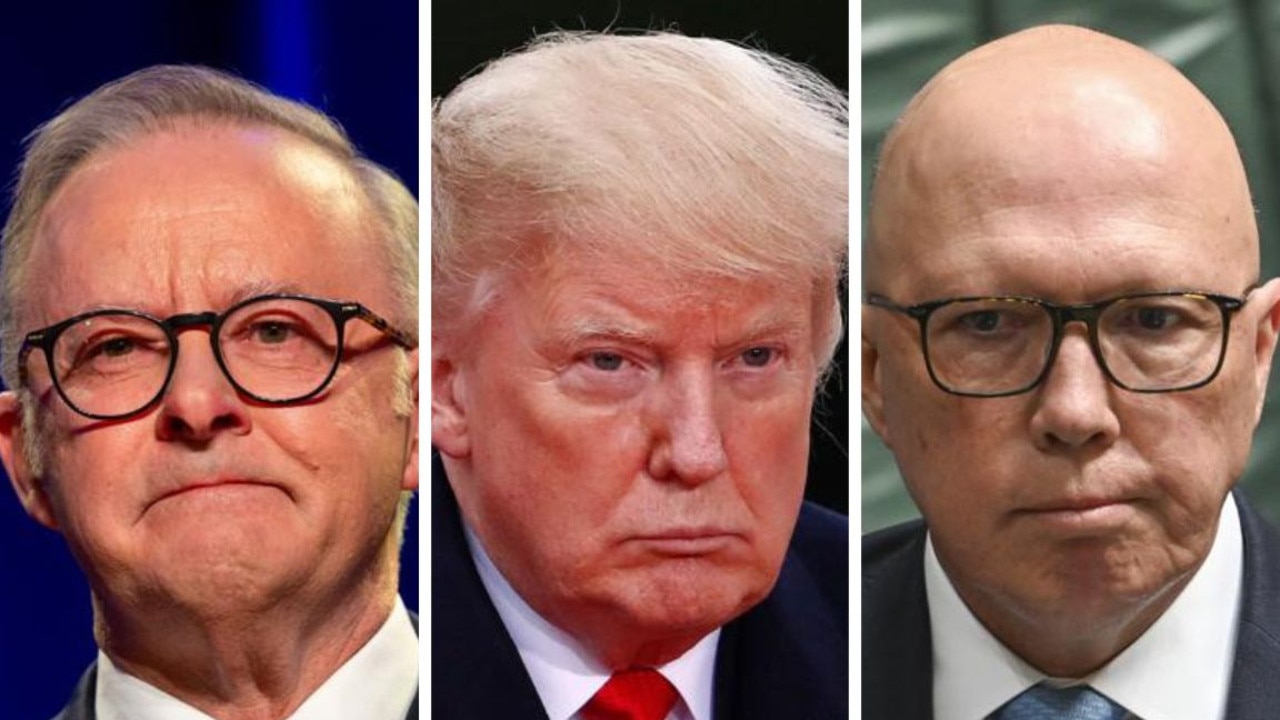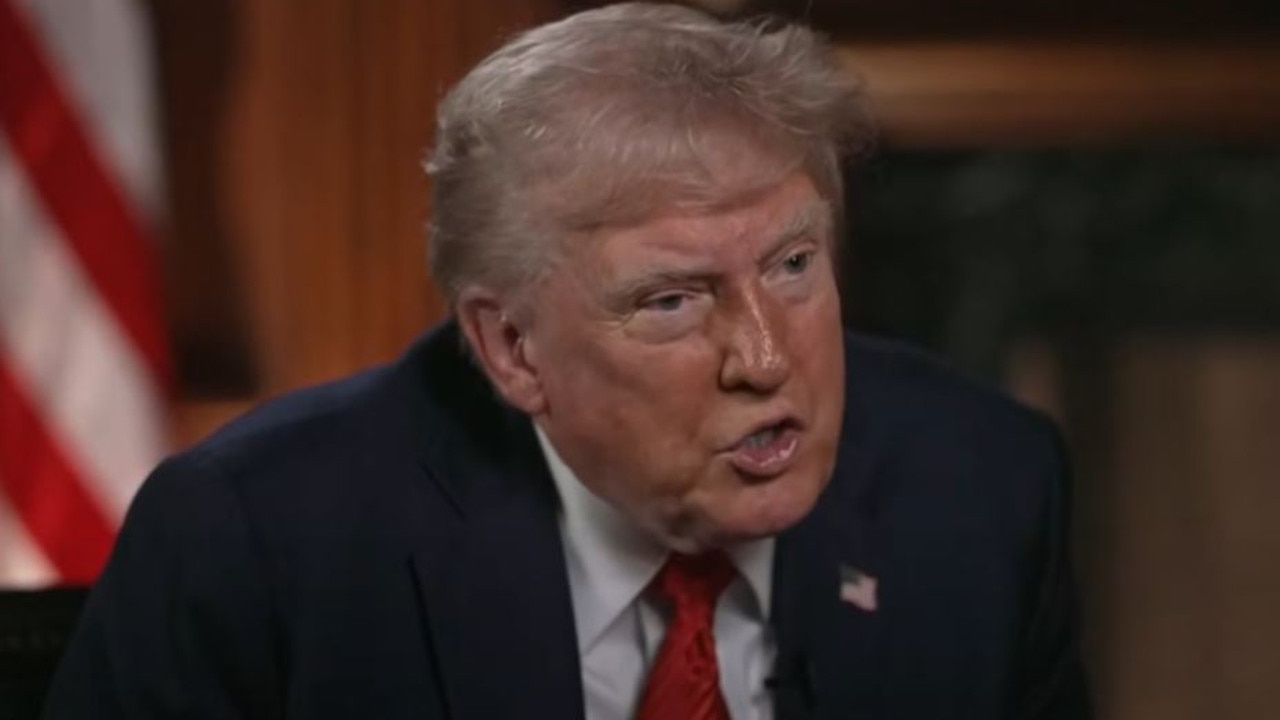Donald Trump refuses to commit to ‘peaceful transfer of power’ if he loses election
Donald Trump was asked a simple question – will he commit to a peaceful transition of power if he loses to Joe Biden? His answer stunned.

Donald Trump has refused to commit to a peaceful transferral of power, should he lose the upcoming presidential election to Democratic nominee Joe Biden.
For months, the US President has been predicting that an increase in the number of Americans choosing to vote by mail due to the coronavirus pandemic will lead to widespread voter fraud.
He has told his supporters the Democrats will try to “steal” the election from him.
Mr Trump’s critics fear he is pre-emptively deligitimising the election result in case he loses to Mr Biden.
At today’s White House media briefing, a reporter asked Mr Trump point blank whether he would yield power.
“Win, lose or draw, will you commit here today for a peaceful transferral of power after the election?” they asked.
“Well we’re going to have to see what happens,” Mr Trump responded.
“You know that I’ve been complaining very strongly about the ballots. And the ballots are a disaster.”
“But people are rioting. Do you commit to making sure there is a peaceful transition of power?” the reporter interjected.
“Get rid of the ballots and we’ll have a very peaceful – there won’t be a transfer, frankly. There’ll be a continuation,” said Mr Trump.
“The ballots are out of control. You know it, and you know who knows it better than anybody else? The Democrats.”
That answer sparked a bit of a freakout online, as you can see below.
RELATED: Donald Trump claims mail voting will cause massive fraud
RELATED: ‘Substantial’ chance there’ll be no result on election night
Fundamental to democracy is the peaceful transition of power; without that, there is Belarus. Any suggestion that a president might not respect this Constitutional guarantee is both unthinkable and unacceptable.
— Mitt Romney (@MittRomney) September 24, 2020
JUST IN: Asked if he'd "commit to making sure that there is a peaceful transferral of power after the election," Pres. Trump says, "Well, we're going to have to see what happens." https://t.co/JsAo4rBy2e pic.twitter.com/8haEyDVsdx
— ABC News (@ABC) September 23, 2020
Oh my god.
— Sarah Longwell (@SarahLongwell25) September 23, 2020
Republicans. Say something. https://t.co/MQ56fgN1tD
This is alarming https://t.co/92gH6giOYG
— Daniel Hurst (@danielhurstbne) September 23, 2020
OK this is real bad tho https://t.co/7K9sLEFkQX
— Nate Silver (@NateSilver538) September 23, 2020
Seriously, we cannot let this one slide as just another crazy thing the crazy president crazily said because he's a crazy norm-breaking crazy guy.
— Tom Nichols (@RadioFreeTom) September 23, 2020
This is beyond norm-breaking or lib-owning. This one should be the red line for even the die-hards. This is the moment. https://t.co/ll3Ki77Mte
Mr Trump was specifically talking about mail-in ballots, not votes cast in person.
The President’s belief that the Democrats are plotting to win the election through large scale mail voter fraud was amplified yesterday by his son, Donald Jr.
“The radical left are laying the groundwork to steal this election from my father,” Donald Jr told supporters in a Trump campaign video.
“Their plan is to add millions of fraudulent ballots that can cancel your vote and overturn the election.”
All the evidence shows that mail voter fraud – like all voter fraud – is extremely rare.
Across the entire United States, there have only been 143 criminal convictions related to the “fraudulent use of absentee ballots” in the last two decades.
“We are talking about an occurrence that translates to about 0.00006 per cent of total votes cast,” political scientist Charles Stewart and the former Denver elections director Amber McReynolds wrote in a piece for The Hill earlier this year, in which they tried to dispel the “vote-by-mail fraud myth”.
Based on previous elections, the Brennan Centre has estimated the risk of mail ballot fraud to be between 0.00004 and 0.0009 per cent.
The Massachusetts Institute of Technology has concluded mail ballots are more vulnerable to fraud than in-person ballots, but the institution says it remains an extremely rare occurrence.
“There are two major features of (absentee voting) that raise these concerns. First, the ballot is cast outside the public eye, and thus the opportunities for coercion and voter impersonation are greater,” MIT said.
“Second, the transmission path of ballots is not as secure as traditional in-person ballots. These concerns relate both to ballots being intercepted and ballots being requested without the voter’s permission.
“As with all forms of voter fraud, documented instances of fraud related to mail voting are rare.”
And the head of America’s Federal Election Commission, Ellen Weintraub, sought to downplay concerns about the legitimacy of mail ballots last month.
“Most states allow absentee voting. It’s been done before. It’s safe. There is no substantial risk of fraud involved in absentee voting,” Commissionr Weintraub said.

However Ms Weintraub, a Democrat, also warned Americans that the surge in mail voting could mean there is no winner declared on election night.
Mail-in ballots always take longer to count than in-person ballots.
“Let me just tell everybody, we’re all going to need to take a deep breath and be patient this year,” she said.
“Because, you know, there’s a substantial chance we are not going to know on election night what the results are. Possibly for the presidency, but maybe for many other races that are important to people.”
The presidency isn’t the only job up for grabs on election day. Races for Congress, the Senate and state offices like governorships will also be decided on November 3.
“That’s OK. If it takes a little bit longer to count the votes accurately, that’s what we need to do in order to ensure that everyone’s vote counts,” she concluded.
What happens if the early returns on election night put Mr Trump ahead, but as the mail vote is counted, Mr Biden pulls in front of him? Will the President accept the result, or claim he’s been robbed and refuse to concede?
This week’s debate over the Supreme Court vacancy created by Justice Ruth Bader Ginsburg’s death might give us a clue.
The Republicans have argued they should fill Justice Ginsburg’s seat before the election, returning the court to its full complement of nine, in case there is litigation afterwards.
“I think this will end up in the Supreme Court. And I think it’s very important that we have nine Justices,” Mr Trump said earlier this week.
“I think it’s better if you go before the election because I think this scam that the Democrats are pulling – it’s a scam – this scam will be before the United States Supreme Court. And I think having a four-four situation is not a good situation, if you get that.
“I don’t know that you’d get that. I think it should be eight-nothing or nine-nothing. But just in case it would be more political than it should be, I think it’s very important to have a ninth Justice.”
Mr Trump is, in other words, predicting that a legal challenge in the wake of the election will end up before the Supreme Court.




